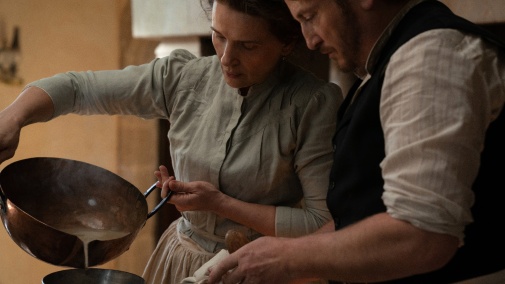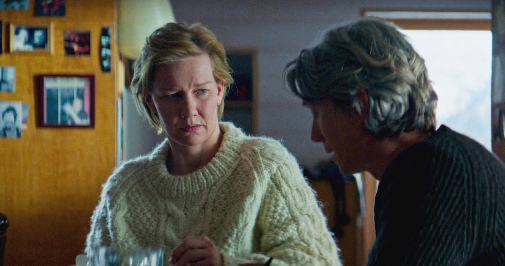
The César Awards ceremony happens tomorrow, with Anatomy of a Fall poised for a sweep befitting its status as an Oscar darling. For some, its victory will taste like justice after what many have decried as a scandalous snub. After all, despite its acclaim, Justine Triet's film wasn't selected to represent France in the Best International Film race. Instead, the selection committee went with Trần Anh Hùng's The Taste of Things, which competed against Anatomy in Cannes, losing the Palme d'Or but nabbing the Best Director prize. The decision generated much press, with people decrying it as undue punishment toward Triet, who criticized Emmanuel Macron's government in her Palme acceptance speech.
However, this perceived indignity has led to its own backlash. Hùng's film has been belittled nonstop, including by Triet on social media. It all culminated with the César nominations, where France's Oscar submission got three "below-the-line" nominations and nothing else…

To grasp the totality of this story, one must go back to 2022, when France overhauled the submission process. This change came just three years after another revamp when industry professionals were called into the discussion for the first time. Regarding the 2022 developments, the most notable alteration was also how the selection committee would be composed. But instead of inclusions, it was exclusions. Thierry Frémaux, head of the Cannes Film Festival, would no longer participate, and representatives from the César Academy and Unifrance would be allowed in meetings, but never as more than observants.
National and international sources point to the 2021 selection of Titane instead of Happening as the reason for all this fuss. According to the National Cinema Centre, a new process more focused on the views of industry professionals who understand the international market should bring about better strategic decisions. In other words, they'd pick titles prone to get Oscar gold rather than merely relying on festival buzz and the sort. But who selects the selectors? That would be the French culture minister, bringing together a group of seven. Afterward, the operation would be divided into two parts.
First, the committee should select between five and six candidates whose teams would be informed and asked to pitch their campaign plans. Then, on a second round of discussions and votes, the official submission would be settled. For 2023, the committee was composed of the following professionals. There's Patrick Wachsberger, former Lionsgate co-chief. Sabine Chemaly and Tanja Meissner are from the international sales area. They were joined by producer Charles Gillibert and composer Oscar-winning composer Alexandre Desplat. Finally, we have two directors, Mounia Meddour and Olivier Assayas.

Their first meeting happened on September 13th, resulting in five finalists: Triet's Anatomy of a Fall, Hùng's The Taste of Things, Clement Cogitore's Sons of Ramses, Thomas Cailley's The Animal Kingdom, and Denis Imbert's On the Wandering Paths. The so-called auditions and final vote happened on September 21st. Until recently, the only publicly available information about this vote was its result - The Taste of Things as the country's official submission, the first time a French filmmaker of Asian origins was chosen to represent the nation. In the days following, the most ardent Anatomy of a Fall supporters proclaimed Triet's "snub" as a political move, not to mention sexist.
When doubts came about regarding how much English dialogue the film contains, American distributor NEON was quick to say that it was within the bounds established by the Academy's rulebook – I have my doubts. At the time, neither Hùng, his team, nor IFC Films were especially vocal, allowing a corrosive narrative to emerge. Suddenly, The Taste of Things was one of the season's villains. And as a villain, it was trounced by the hand of awards voters everywhere. At the Lumières Awards, it received one nomination – Best Cinematography – and despite making the shortlist, it failed to secure an Oscar nod. Then came the French Academy, which gave it a paltry trio of nods for Cinematography, Production Design, and Costume Design.

If you think this is just paranoia on my part, Juliette Binoche came to her film's defense and finally commented on the backlash in an interview with the New York Times. She took particular umbrage with the French Press, who were quick to dismiss Hùng's miracle of a romance as old-fashioned, boring, and too conventional for AMPAS (imagine!). The worst part was how big names in the industry backed these views, indirectly cosigning the vitriolic anti-campaign. It's fair to say I empathize more with Binoche than those critics who came for The Taste of Things. In my view, it's one of 2023's best films, a feat that calls for classicism while devoting itself so wholeheartedly to a formalistic approach that it can't help but feel risky.
To quote myself and my giant Twitter thread of FYCs: Trần Anh Hùng appeals to classic technique and period stylings but is always looking forward to an abstract cinema of the senses. Here, he accomplishes an Epicurean experience beyond compare. Who needs sex when you can see two bodies work in perfect unison over a feast of French cuisine? Somehow, jump cuts are part of the harmony, smoothly fitting besides long balletic takes. So intoxicatingly elegant, you feel drunk. The rhyme of pears and a naked back is an erotic pièce de résistance. And then there are the lovers, the actors. The way Magimel looks at his real-life ex eating is a marvel - a sex scene with no sex, erotic beyond belief.

Hell, I think it's better than Anatomy of a Fall, polemic aside, and it would have been a better Palme d'Or winner. As far as the committee goes, some of the members agreed. According to recent press, the vote came down to Desplat, Meddour, Chemaly, and Meissner voting for Hùng's film, while Gillibert, Wachsberger, and Assayas went with Triet's candidate. Keen on stoking the flames, Assayas has said it felt like an orchestrated campaign that he arrived in the room for discussion, but the Taste of Things supporters had already made up their minds – there was no room for debate. Gillibert was more diplomatic.
He described the whole affair as an unpleasant experience, though it was impossible to confirm or deny if it had been a political decision. There have been speculations that one of the Taste of Things voters tried to change their decision, but it was too late. Others have surmised that the committee members latched onto Hùng's film because of its essential French-ness, a celebration of national culture and gastronomy, and even literature if one accounts for Marcel Rouff's The Passionate Epicure as a point of inspiration. In the end, to quote Assayas for Le Monde: "I'm so sorry that the film by Trần Anh Hùng, a filmmaker I respect and who I consider a friend, has been embroiled in a dispute that had nothing to do with it."
I know where I stand on this matter. Yet, I also feel sorry for all involved. The filmmakers didn't deserve to have this controversy overshadowing their achievements. Of course, while Triet is being vindicated, there seems to be no such justice for Hùng, Binoche, Magimel, their crew, and The Taste of Things as a whole. Maybe it'll win a consolation prize tomorrow, though that seems unlikely. It should be up for so many other honors. For Hùng's mellifluous direction, the central performances full of longing, the sharp editing, the sound of a working kitchen, and the silence after a tragedy plunges the space into indolence. I can only urge you, dear readers, to see the film, bask in its sensual glory, and get drunk on its cinematic ambrosia.

The Taste of Things is currently enjoying its release in American theaters. Anatomy of a Fall is available on most major PVOD platforms.